Website Builder SEO vs WordPress SEO: Which One Is Better?
If you click to purchase a product or service based on our independent recommendations and impartial reviews, we may receive a commission. Learn more
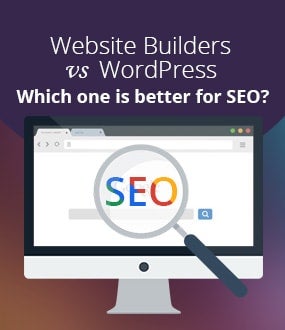
“Is SEO for website builders or SEO for WordPress better?”
It’s a good question and we get asked that a lot when comparing website builders.
You probably have similar (yet common) questions, such as:
- Which website builder is the best for SEO?
- Does a specific website builder have a natural advantage when it comes to ranking higher in Google?
- Everybody and their cats tell me that WordPress SEO is the best and is the only way to rank high in search results. True?
- People say drag & drop website builders are terrible at ranking in Google. Myth?
Want my quick opinion?
- Don’t know.
- Probably.
- False.
- Totally a myth.
Are you surprised with my opinions? Maybe?
If you know what SEO (“Search Engine Optimization”) is, then you know it’s one of the main lifeblood to your website.
If you haven’t heard of SEO, basically, it’s a process to help your website rank higher in search engines such as Google.
Once your website gains more visibility in search results (ranks higher), then more people will visit your website.
Makes sense, right?
In this post, I want to share my own opinions about SEO and website builders with you.
I can’t tell you which specific website builder is the best for SEO, but I can try to dispel some common myths / misinformation about this topic – based on my own experiences.
Before we get stuck in, check out our highest rated website builders:
Note: If you asked 100 people about SEO, you’ll probably get 100 different opinions. I’m not the leading expert by any means (though I will link to some of them throughout my discussion below). I’m just sharing what worked for us in the past, and so it may or may not work for you.
Now that I’ve made my disclaimer, hopefully, I won’t get rocks thrown at me by hardcore SEO fanatics. Probably will, though!
Choose a website builder and make money online today
What type of site do you want to build?


Using WordPress Does NOT Mean You Will Receive Higher Search Rankings
“There is a lot of misinformation about WordPress websites always ranking better than websites built with website builders. This just isn’t the case based on our experiences.”
Say whaaaat?
I know some of you are probably going to jump out of your seats because you think I’m hating on WordPress.
I don’t hate WordPress.
I actually enjoy using it because after years of building websites with both drag & drop website builders and with WordPress, I’ve learned to use it very proficiently and dare I say, I even learned how to write a little bit of code!
In fact, this website is built on WordPress – because it is the best platform for writing blog posts.
But when I first started creating websites, WordPress was a tough beast to tame. I was attracted by its cheap website building cost.
It was confusing, way too technical (for dumb ol’ me anyway), and if I wanted to make any design changes or move my content around, I needed to write code or hire someone who can.
I’ll admit it – WordPress made me feel dumb.
I was working a full-time job and just didn’t want to deal with learning all the technical stuff that came with WordPress after I got home from work.
That’s why I turned to drag and drop website builders – which made me feel less dumb!
They empowered me to build websites quickly, cheaply and appeared like a coding rock star during family fireside chats (major drawback: everyone started asking me to build websites for them…)
So why does everyone on the internet who seemed to know something about building websites say using WordPress will help you rank higher in search engines?
Hmmm, excellent question. I have no idea actually.
Maybe they read it somewhere, and so they regurgitated it to others? After a few rounds of that, it sort of morphed into some form of “truth”, you know what I mean?
We’ve all experienced that, and it’s so easy to do so on the internet where people can be less accountable for what they say.
I used to believe in that as well until some of our websites that are built on drag & drop website builders (such as Wix, Squarespace, Weebly) started appearing on the first page of Google.
These websites from our previous projects outranked even some WordPress websites.
Gasp! No way!!
That’s what I thought as well, right?!
Here’s the thing. “Everybody” says WordPress is the best for SEO – but how can they definitively say so?
The “Impossible” SEO Experiment That Nobody Conducted
“I haven’t seen any definitive proof that WordPress websites always rank better than non-WordPress websites. Probably because no such research exists?”
I was surfing the internet, hoping that someone has conducted an experiment to see if the thesis was true – that using WordPress could easily outrank websites built with drag & drop website builders.
But then I thought, “How could someone design this experiment?”
I’m not a scientific researcher by training, but I can appreciate the best way to test whether a single factor made a difference, is by keeping all other factors constant / the same, and the only difference is which website builder was used.
This is the only way you can truly tell if using a specific website builder made a meaningful difference.
Is it even possible to run a “pure” experiment? Can each website be exactly the same and receive the same treatment?
- Could each website all share the same domain name? – No
- Could each website have the exact same content? – Yes
- Could each page be published at the same exact time? – Probably
- Could each website receive the same level of promotion? – Probably not
- Could each website receive the exact same backlinks from other websites (when other websites link back to your website)? – No
It’s practically impossible to build exact same websites on different website builders, as you can’t control how other people react to each one of the websites.
So how could someone definitively say a specific website builder is better for SEO?
To illustrate this point, consider this example.
Let’s say a few websites were created for this experiment and the websites were about dog training.
Each website was built on a different website builder, had the exact same content about dog training, same design, received the same level of promotion, and even had the exact same domain name (which is impossible, but let’s keep going with this assumption).
On one beautiful morning, a dog training specialist, who is a bit of a celebrity or authoritative figure online (she publishes digital dog training magazines and has tens of thousands of followers and fans), came across one of these experimental websites.
She saw the experimental website built with Wix, loved it, wrote an article about it and shared it with thousands of her followers.
So the website that was built with Wix got a lot of online love from this authoritative figure.
She linked to this website from her own website (which ranked very high in Google, as Google recognized her website as an authority site), and so did a lot of her fans as her fans trust her opinion and what she said about your website.
Your website also got its “15 minutes of fame” when a lot of people shared it with their social networks.
Magically, Google also started to give your website some love and your website (built with Wix) starts to rank higher, and higher in search results.
Did this influential doggy expert have an equal chance of stumbling on to your other experimental websites other than the one built with Wix?
Under our hypothetical experiment parameters – Yes.
So, does this mean that your Wix website is better for SEO than the other websites?
– No.
Helpful & Resourceful Content Is A Major Factor In Receiving Higher Search Engine Ranking – Not Which Website Builder You Used
“Google and other leading SEO experts have confirmed that backlinks and content are the most important factors in achieving higher search engine rankings.”
Questions for you to ponder:
- Did your website start gaining popularity because it was built on Wix? – Don’t think so.
- Would your sudden rise in search rankings be better or worse if you used a different website builder (such as WordPress, Squarespace and Weebly)? – I don’t think so.
The sudden rise in ranking for this experimental website had nothing to do with which website builder you used.
It had everything to do with search engines viewing that this website is helpful – evidenced by an authoritative person and her authoritative website linking to this website, followed by a lot of her fans visiting the website and some of them also linking to the website as well.
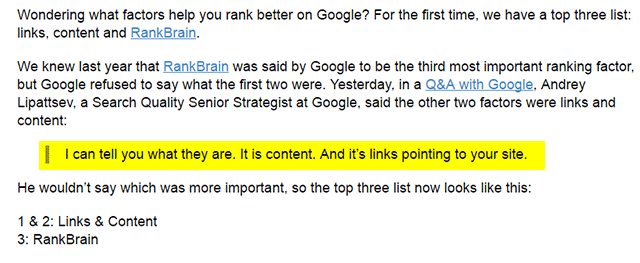
The “social signals” (people sharing and discussing your website on Facebook, Pinterest, Twitter, etc.) also helped a lot, too.
All these are “signals” to Google, demonstrating that your website deserved to show up higher in search results.
Receiving these sort of online endorsements, in my view, is one of the most (if not the most) effective SEO technique and is one of the most important ranking factors that Google considers.
Here’s another way to think about this.
Do you think Google will suggest (basically endorse) your website because it’s built on certain website builder?
– No. It suggests websites in search results because it believes the websites will be helpful to searchers.
If Google stopped serving up search results that best served the interests of people, searchers may consider using another search engine, and that’s bad for Google’s business.
How does Google know if a website will be helpful?
Primarily based on “signals” such as the where (quality) the backlinks are from and the number (quantity) of backlinks your website receives from other websites.
Leading SEO experts believe that Google evaluates each website with over 200 different signals (or ranking factors). Each of these ranking factors carries a different weight.
The number and quality of backlinks are by far two of the most important ranking factors.
So if you focused on this you’ll probably do quite well – it’s the 80/20 of SEO (meaning 80% of your outputs (higher search ranking) are driven by 20% of inputs (focusing on receiving good backlinks from other authoritative websites).
Out of the 200+ ranking factors, which website builder you used is just one of them.
Admittedly, I don’t know precisely how much weight Google places on this factor (only Google knows) – but I speculate that it’s not that significant of a factor, compared to other factors.
But Internet Code Guru’s Say WordPress Has Cleaner / Better Code Base Than Drag & Drop Website Builders!
“Google doesn’t have problems understanding websites built with leading drag & drop website builders. WordPress may have a cleaner code base but its impact on SEO is probably marginal.”
Sure, the code base of some of these drag and drop website builders are not as “clean” as open source codes such as WordPress.
But Google doesn’t have any problems crawling and understanding websites built with website builders.
For instance, Wix is actually highlighted in in Google’s Webmaster Guidelines, right next to WordPress, under the section titled “Help Google Understand Your Pages”:
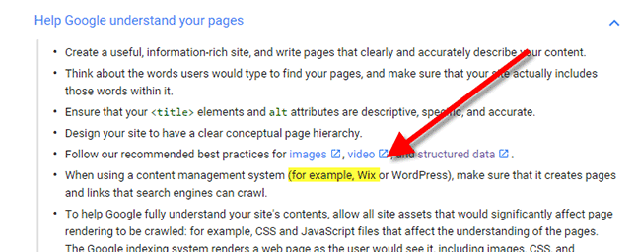
This demonstrates that Google recognizes Wix as a “legitimate” website builder.
There are a lot of internet rumors that Wix is really bad for SEO. I haven’t seen any concrete proof of such claim yet.
In fact, John Mueller of Google addressed this question directly when a person posed a question in Google Webmaster Central Help Forum, asking whether Google dislikes Wix and if websites built with Wix rank poorly in search results.
Here is Google’s answer:
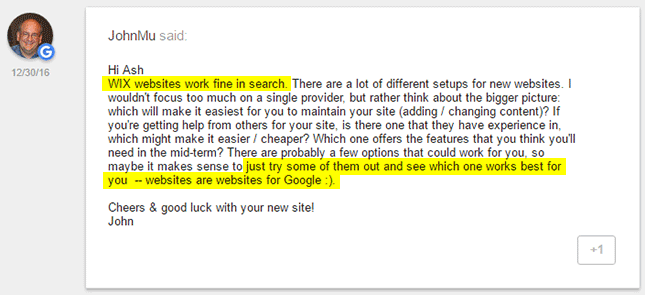
Furthermore, Gary Illyes of Google also confirmed that Google does not give preferential treatments to websites built by static HTML or AJAX (basically, different programming languages):
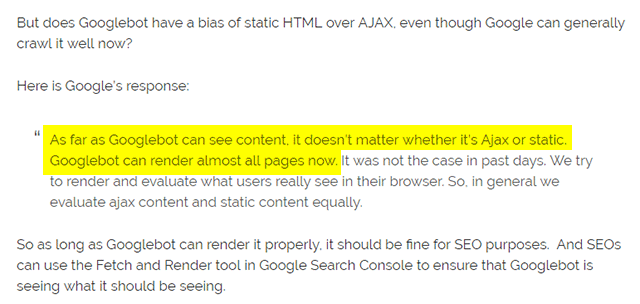
Websites built with Wix are built using HTML5 and AJAX technology. So based on Google’s statement above, the technology that Wix uses to help you build your website is fully recognized and understood by Google.
Here are Rand Fishkin’s thoughts on Squarespace (Rand runs Moz, which is a leading authority on the topic of SEO):
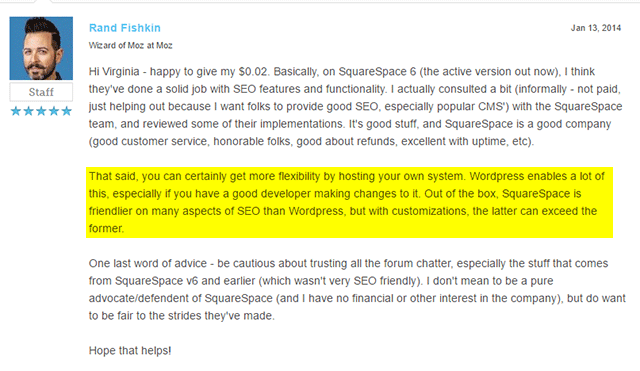
His comment was from 2014, but I believe Squarespace’s SEO capabilities remain robust, even as of today.
Recap
Before we dive deeper into website builders and SEO, here’s a quick summary of what was discussed so far:
- Google doesn’t base its ranking decisions solely on which website builder you use or didn’t use. There are over 200 ranking factors and which website builder you use is just one of them.
- Leading drag and drop website builders also have robust SEO capabilities. Google can understand websites built with those platforms.
- Instead of focusing on “which website builder is better for SEO”, focus on creating top notch content for your followers, and promoting / sharing such content. This is a good way to get leading authoritative figures to link to your website, and sharing your website with his/her followers. This is the easiest and most effective way to show Google your website is worthy of receiving higher search result rankings.
Yes – Drag & Drop Website Builders Do Have Flaws
“With drag and drop website builders, you can’t fine-tune or customize every single aspect of your website. With WordPress, you can have a lot more control over most aspects of your website.”
Drag and drop website builders do have their own sets of flaws when it comes to SEO, though.
The benefit of being able to create a website without writing a single line of code, or being a technical guru, also means you won’t have complete control over every single aspect of the creation process of your website.
For instance, although Weebly (one of the easiest website builders to use) grants you access to edit the HTML and CSS codes of your website, you still can’t control or customize other aspects, such as hosting speed.

Website loading speed is one of Google’s ranking factors.
So if your web pages load really fast, that’s a favorable factor when it comes to SEO as it improves your visitors’ experience (nobody likes to wait for pages to load nowadays).
With WordPress, you can control the speed of your website by upgrading to a faster host (which also means you pay more, though), or fine-tune your servers with the help of capable developers.
Having said that, the majority of websites built with WordPress are using shared hosting, which is similar to the hosting speed you get from drag and drop website builders.
As mentioned, you can certainly sign up to a host that can load your website much faster, but it will cost you (can range from $30 per month to hundreds of dollars per month, versus around $5 per month for shared hosting).
Pro Tip on Improving Page Loading Speed:
One of the biggest culprit to slower web page loading speed is excessively large images. To improve your web pages’ loading speed, make sure you:
(1) compress your image files with free image compressors such as CompressJPEG
(2) use the right image dimension.
For example, don’t insert an image that is 1,000 pixels by 1,000 pixels, then shrink it down to 500 pixels by 500 pixels to fit it into your web page. Your website will load the original, large image dimension (1,000px by 1,000px) which will take longer to load. Resize all your images with free image editors and this can improve your loading speed.
Another criticism that website builders face is that you can’t customize your web page addresses (URLs).
It’s well known that having keywords (what your page is about) in your URL, and keeping your URL as short as possible, has SEO ranking benefits.


For most website builders, you can’t control or customize your page URL.
If you labeled your page as “Awesome Rare Dog Training Methods for German Shepherds”, then your page URL will automatically become:
www.example.com/awesome-rare-dog-training-techniques-for-german-shepherds
While this isn’t terrible, most SEO practitioners will recommend that you change the URL to something shorter and more focused, such as:
www.example.com/dog-training-german-shepherds
The reason being that the words in the URL will help Google focus on what’s really relevant to your page.
With WordPress, you can make this piece of modification with ease.
While most drag & drop website builders won’t allow you to do that, Wix and Squarespace do give you the capability to edit / customize URLs (see this and this).
Website Builders Do Give You Most Of The Basic SEO Tools
In reality, drag & drop website builders already give you most of the basic SEO tools so you can optimize your website to be more SEO friendly:
Best Website Builders for SEO:
| SEO Features | Wix | Squarespace | Weebly |
| Page Title | ✔ | ✔ | ✔ |
| Meta Descriptions | ✔ | ✔ | ✔ |
| Page Level Heading Tags | H1 to H6 | H1 & H2 | H2 only |
| Sitemap | ✔ | ✔ | ✔ |
| Image Alt Tags | ✔ | ✔ | ✔ |
| Customizable URL | ✔ | ✔ | ✔ |
| Mobile Friendly | ✔ | ✔ | ✔ |
| Ability to Add Media (Images / Videos) | ✔ | ✔ | ✔ |
| Connects to Google Analytics | ✔ | ✔ | ✔ |
| Connects to Google Search Console | ✔ | ✔ | ✔ |
Guide from Wix about their SEO features. Also see how they have an “intelligent” system to guide you through the SEO setup process. See their SEO Wiz here and make sure you watch the video.
Guide from Squarespace about their SEO features
Guide from Weebly about their SEO features
Keep in mind that these are called “On-Page SEO” – meaning little bits and pieces that you can configure directly on your website to make it more search engine friendly.
While these are important, don’t forget the 80/20 rule that we discussed above.
A big part of your SEO benefits will come from “Off-Page SEO” (things you can do outside of your website that can lead to higher search rankings) – specifically getting authority websites to link to your website. This shows Google that a trustworthy website is endorsing your website.
It’s not easy, but who says getting having your website ranked high in search results is quick and easy?
It takes time, effort, perseverance – just like building a business!
Conclusion – Effective SEO Doesn’t Rely Solely on Website Builders. It Depends on You.
Listen, it’s not completely false to say WordPress is better from an On-Page SEO perspective. But if you take people’s words at face value, you’ll be sorely disappointed when your website doesn’t auto-magically appear in top search results.
There are a lot more going on with SEO than which website builder to use. Picking an appropriate website builder will only have a marginal impact on your search engine ranking.
I’m more of an opinion that picking the right website builder is also important from perspectives of what you want to get out of the website builder, such as:
- User experience (building websites can be fun and interesting, not like pulling teeth)
- How much resources you have to commit to your website (time & money)
- If you are interested in managing the technical aspects of your website
If you’re don’t have time or interest in learning the technical aspects of building and managing websites, or have the budget to hire a capable developer or designer, then maybe WordPress might not be the best option for you.
We have an in-depth discussion about this idea here. See how much does a web site cost here.
Keep in mind that there are over 200 search ranking factors. With WordPress and some technical assistance from a capable developer, you can fine-tune your website to become more favorable in the eyes of search engines.
But drag & drop website builders are not terrible for SEO at all. Sure, they are not as customizable as WordPress, but tweaking On-Page SEO will not catapult you from the bottom of page 10 of search results to page 1.
For Google to reward your web pages with high search rankings, they need to see that your website is helpful to searchers. For this to take place, one of the biggest factors they need to see is other authority websites linking to your website. They also want to see your web pages being shared and discussed around the internet.
So in other words, your website needs to achieve a bit of a “celebrity” status.
How? By consistently creating very helpful, the best content available online. How else could you expect to receive high search rankings if your content is not the best of the best?
Further, you’ll need to promote your content instead of sitting idly, wishing for someone to discover you.
It’s easy to think that by optimizing or doing all the right things with your website, then good search rankings will come. It’s much more uncomfortable and challenging to create industry leading content, and sharing it with your targeted audience.
It takes work to reach out to thought leaders and authorities within your niche to build relationships with them so they just might endorse / link back to your content. This is not that much different than going out to networking events to meet people and share your opinions and ideas.
It’s much easier (and lazier) to sit at home and perfect your resume and cover letters. Perfecting them is important, no doubt. But putting yourself out there is arguably more important and effective. Building real relationships open up a lot of doors.
Achieving a “celebrity” status for your website is challenging and takes time (think years, not days). That’s why those who are committed for the long haul has a much higher chance of succeeding, and those who give up after a week because their website is not ranked on page 1 of search results will always disappear off the grid (and complain that the website builder they used didn’t work).
The key point is, being rewarded with higher search engine ranking IS achievable – no matter which website builder you use.
If you are new to building websites, or if you don’t have the technical knowledge or resources (time and money) to use WordPress, I’d suggest you test out drag and drop website builders. You don’t need to know how to code to build a professional looking website – all by yourself.
Found This Guide Helpful?
Question – Did this guide benefit you? Leave a comment below.
Do you know anyone who can benefit from this guide? Send them this page or click on the share buttons on the left.
You’ll be helping us out by spreading the word about our website, and you’ll be helping them out!








102 comments